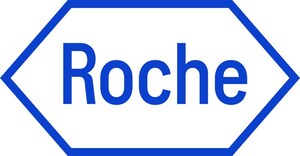Roche receives FDA approval for cobas® EGFR Mutation Test v2 as a companion diagnostic for non-small cell lung cancer therapies
Next-generation test using tissue samples is approved for use as a companion diagnostic with AstraZeneca's new therapy, TAGRISSO™
PLEASANTON, Calif., Nov. 13, 2015 /PRNewswire/ -- Roche (SIX: RO, ROG; OTCQX: RHHBY) today announced that the U.S. Food and Drug Administration (FDA) has approved the cobas® EGFR Mutation Test v2 for companion diagnostic use. The next-generation test from Roche includes expanded mutation coverage of the epidermal growth factor receptor (EGFR) gene in DNA derived from tumor tissue. The test can be used to select eligible non-small cell lung cancer (NSCLC) patients who harbor a T790M mutation, for treatment with AstraZeneca's newly approved therapy, TAGRISSO™ (osimertinib), or for eligible NSCLC patients with exon 19 deletions or L858R mutations for treatment with Tarceva® (erlotinib).
"Today's FDA approval and companion diagnostic designation for the cobas® EGFR Mutation Test v2 is an important advancement in the testing of lung cancer patients," said Paul Brown, Head of Roche Molecular Diagnostics. "With this test, physicians can identify those patients whose tumor harbors an EGFR mutation and therefore are eligible for important targeted therapies for first-line and subsequent lines of treatment, thus expanding their therapy options."
"The approval of TAGRISSO™ with the cobas® EGFR Mutation Test v2 companion diagnostic exemplifies our focus and commitment to advancing personalized medicines in lung cancer by bringing new treatment options to patients and physicians. Now that TAGRISSO™ is approved, ensuring that patients who progress on an EGFR tyrosine kinase inhibitor (TKI) are tested for the T790M is critical to identifying those that are most likely to benefit from this new medicine," said Antoine Yver, Head of Oncology, Global Medicines Development at AstraZeneca.
The American Cancer Society estimates that in 2015, there will be 221,200 new cases of lung cancer, with 158,040 dying from the disease this year. Each year, more people die of lung cancer than colon, breast and prostate cancers combined. The cobas® EGFR Mutation Test v2 is intended to be used as an aid in the identification of NSCLC patients for whom treatment with Tarceva® (erlotinib), in first-line therapy, and TAGRISSO™ (osimertinib) in second and subsequent lines of therapy, may be effective.
About the cobas® EGFR Mutation Test v2
The cobas® EGFR Mutation Test v2 is built upon the success of the cobas® EGFR Mutation Test available in the U.S. market today, with expanded mutation coverage that identifies 42 EGFR mutations in exons 18-21, including L858R, exon 19 deletions, and T790M. The test is performed on the cobas® 4800 System, which offers high-performance amplification and detection coupled with software that automates results interpretation and reporting. The cobas® 4800 System menu for oncology in the U.S. includes the cobas® EGFR Mutation Test v2, the cobas® EGFR Mutation Test, the cobas® KRAS Mutation Test, and the cobas® BRAF V600 Mutation Test.
About TAGRISSO™
TAGRISSO™ is an oral TKI, potent and selective irreversible inhibitor of EGFR harbouring sensitizing mutations (EGFRm; Exon 19 deletion and L858R) or TKI-resistance T790M mutations. Non-clinical in vitro studies have demonstrated that TAGRISSO™ has high potency and inhibitory activity against mutant EGFR phosphorylation across a range of all clinically relevant EGFRm and T790M mutant NSCLC cell lines while showing significantly less activity against EGFR in wild-type cell lines. The EGFR T790M mutation is found in up to approximately two-thirds of cases that have progress on or after EGFR-TKI treatment. Ensuring that patients are tested for the T790M mutation after treatment with an EGFR-TKI is critical to gaining benefit from this new treatment.
About Tarceva
Tarceva is a once-daily, oral non-chemotherapy medicine for the treatment of advanced or metastatic NSCLC. It has been shown to inhibit EGFR, a protein involved in the growth and development of cancers. Tarceva is developed and commercialised by Astellas Pharma U.S. in partnership with Genentech in the United States, Chugai in Japan and Roche in the rest of the world.
About Roche
Headquartered in Basel, Switzerland, Roche is a leader in research-focused healthcare with combined strengths in pharmaceuticals and diagnostics. Roche is the world's largest biotech company, with truly differentiated medicines in oncology, immunology, infectious diseases, ophthalmology and neuroscience. Roche is also the world leader in in vitro diagnostics and tissue-based cancer diagnostics, and a frontrunner in diabetes management. Roche's personalised healthcare strategy aims at providing medicines and diagnostics that enable tangible improvements in the health, quality of life and survival of patients. Founded in 1896, Roche has been making important contributions to global health for more than a century. Twenty-nine medicines developed by Roche are included in the World Health Organization Model Lists of Essential Medicines, among them life-saving antibiotics, antimalarials and chemotherapy.
In 2014, the Roche Group employed 88,500 people worldwide, invested 8.9 billion Swiss francs in R&D and posted sales of 47.5 billion Swiss francs. Genentech, in the United States, is a wholly owned member of the Roche Group. Roche is the majority shareholder in Chugai Pharmaceutical, Japan. For more information, please visit www.roche.com.
All trademarks used or mentioned in this release are protected by law.
For media inquiries please contact:
Bob Purcell, Roche Molecular Diagnostics
+1-888-545-2443 (US)
SOURCE Roche
Related Links
WANT YOUR COMPANY'S NEWS FEATURED ON PRNEWSWIRE.COM?
Newsrooms &
Influencers
Digital Media
Outlets
Journalists
Opted In





Share this article